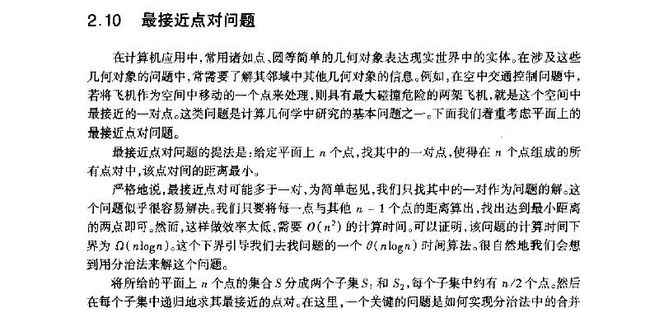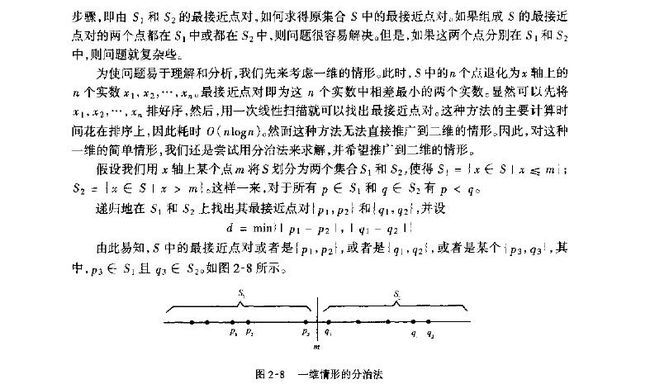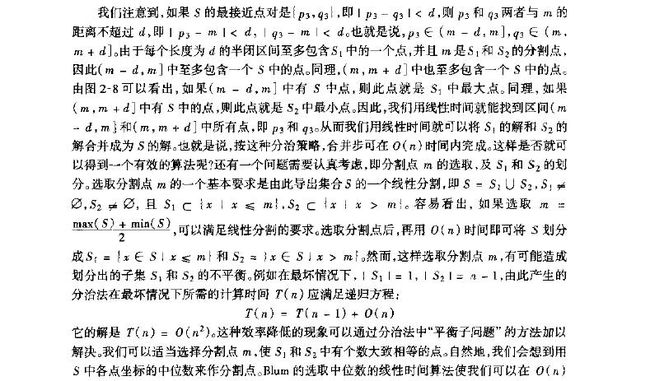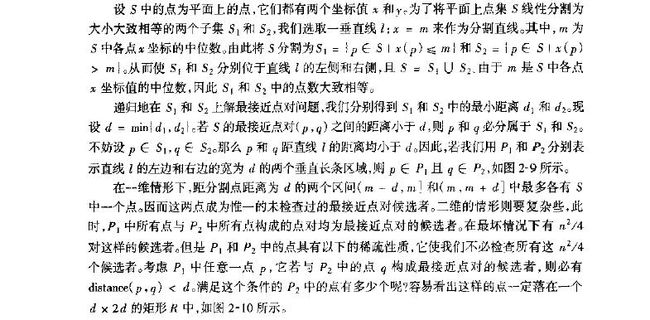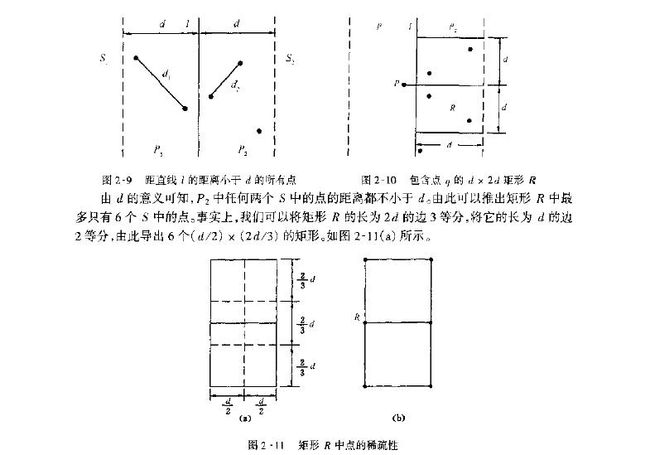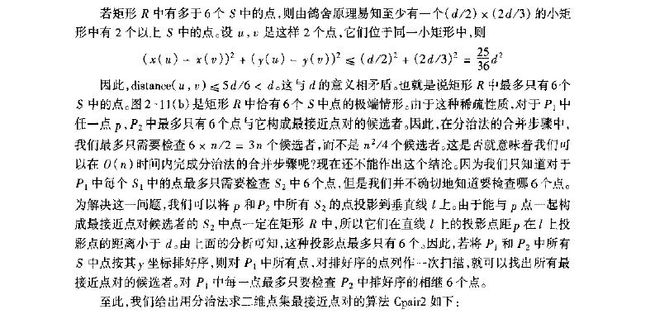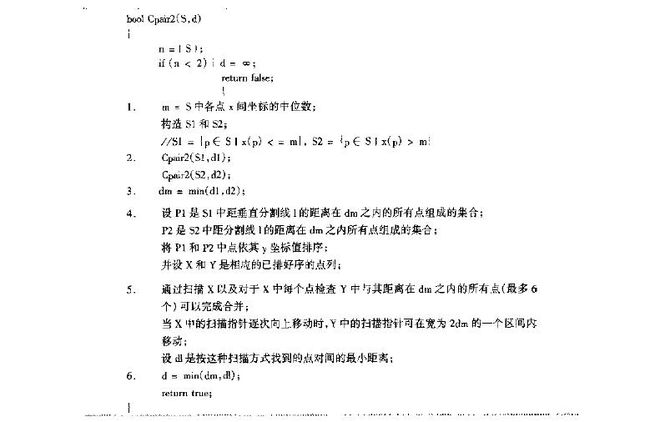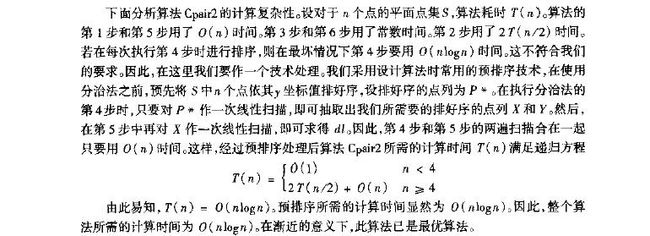平面点对实验
OJ地址:POJ3714 ZOJ2107 HDU1007
参考:点击打开链接
本人的实验程序:
package sse.algorithm;
import java.util.ArrayList;
import java.util.List;
public class ClosestPointPair {
/*
* 实验:分治法O(n*lg(n))时间内求二维点集最近点对算法
* 作者:xxxxxxx098
* 时间:2012-12-07 19:00
*/
/*
* boolean Cpair2(S,d)算法步骤:
* n = |S|;
* if(n < 2) return false;
* 将点集 S 中的点依其 y 坐标值排序,然后作以下事情
* 1. m = S中各点x横坐标的中位数
* 构造S1,S2
* S1 = {p in S| x(p) <= m}, S2 = {p in S| x(p) > m}
* 2. Cpair2(S1,d1)
* Cpair2(S2,d2)
* 3. dm = min(d1,d2)
* 4. 设P1是S1中距离垂直分割线l的距离在 dm 之内的所有组成的集合,
* P2是S2中距离垂直分割线l的距离在 dm 之内的所有点组成的集合,
* 5. 通过扫描 P1 以及对于 P1 中每个点检查 P2 中与其距离在 dm 之内的所有点(最多6个)可以完成合并
* 当 P1中 扫描指针逐次向上移动时,P2中的扫描指针可在宽为 2dm 的一个区间内移动
* 设dl是按这种扫描方式找到的点对间的最小距离
* 6. d = min(dm,dl)
* return true;
*
*/
public Point p1;//最近点对中p1的坐标
public Point p2;//最近点对中p1的坐标
public double d = Double.MAX_VALUE;//点对间的距离
//public Logger log = Logger.getLogger(ClosestPointPair.class);
public ClosestPointPair(){}
/*
* 返回List[start..end]中第order小的元素的x属性的值
*/
public double find(List<Point> S,int start,int end,int order){
if(start>end || order>end-start+1){
return -1;
}
int res = partitionX(S,start,end);
int k = res-start+1;
if(k == order)
return S.get(res).x;
else if(k > order)
return find(S,start,res-1,order);
else
return find(S,res+1,end,order-k);
}
// 依x 坐标值寻找划分元的位置,返回划分元在S中的下标
public static int partitionX(List<Point> S,int low, int high){
int randomPivot = low+ (int)(Math.random()*(high-low+1));
double pivotValue = S.get(randomPivot).x;
while(low < high){
//从右边找比枢纽元素小的的元素
while((low < high) && (S.get(high).x >= pivotValue)){
high--;
}
//交换两个元素
S.get(low).swapWith(S.get(high));
//从左边找比枢纽元素大的的元素
while((low < high) && (S.get(low).x <= pivotValue)){
low++;
}
S.get(high).swapWith(S.get(low));
}
return low;
}
/*
* 以下完成把点集 S 中的点依其 y 坐标值排序
*/
public static void sortPointListByY(List<Point> S,int low,int high){
if(low < high){
int mid =partitionY(S,low,high);
sortPointListByY(S,low,mid-1);
sortPointListByY(S,mid+1,high);
}
}
// 依y 坐标值寻找划分元的位置
public static int partitionY(List<Point> S,int low, int high){
int randomPivot = low+ (int)(Math.random()*(high-low+1));
double pivotValue = S.get(randomPivot).y;
while(low < high){
//从右边找比枢纽元素小的的元素
while((low < high) && (S.get(high).y >= pivotValue)){
high--;
}
//交换两个元素
S.get(low).swapWith(S.get(high));
//从左边找比枢纽元素大的的元素
while((low < high) && (S.get(low).y <= pivotValue)){
low++;
}
S.get(high).swapWith(S.get(low));
}
return low;
}
/*
* 以下求二维平面的最近点对
* Cpair2(S1,d1)
* Cpair2(S2,d2)
* dm = min(d1,d2)
* 设P1是S1中距离垂直分割线l的距离在 dm 之内的所有点组成的集合,
* P2是S2中距离垂直分割线l的距离在 dm 之内的所有点组成的集合,
*
* 通过扫描 P1 以及对于 P1 中每个点检查 P2 中与其距离在 dm 之内的所有点(最多6个)可以完成合并
* 当 P1中 扫描指针逐次向上移动时,P2中的扫描指针可在宽为 2dm 的一个区间内移动
* 设dl是按这种扫描方式找到的点对间的最小距离
*
* d = min(dm,dl)
*
*/
public double Cpair2(List<Point> S) {
if(S.size() < 2)return Double.MAX_VALUE;
List<Point> S1 = new ArrayList<Point>();
List<Point> S2 = new ArrayList<Point>();
double median = find(S, 0, S.size()-1, (int)((S.size()+ 1)/2));
dividePoints(S,median,S1,S2);//将点集一分为二
double d1 = Cpair2(S1);
double d2 = Cpair2(S2);
double dm = Math.min(d1, d2);
List<Point> P1 = new ArrayList<Point>();
List<Point> P2 = new ArrayList<Point>();
narrowToP1P2(S1,S2,median,dm,P1,P2);//缩小S1,S2的范围至P1,P2
//扫描P1
double tmp;
Point point1 = null;
Point point2 = null;
for(int i=0;i<P1.size();i++){
point1 = P1.get(i);
//以下获得P2中的候选点,count计数最多6个
for(int j=0,count=0;j<P2.size() && count<6;j++){
point2 = P2.get(j);
if(Math.abs(point1.y - point2.y) <= dm){
count++;
//逐一检查候选点
tmp = point1.distanceTo(point2);
if(tmp < this.d){
this.d = tmp;
this.p1 = point1;
this.p2 = point2;
}
}
}
}
return Math.min(dm, this.d);
}
//按S中x坐标的总位数,把S划分为S1,S2
//其中,S1 = {p in S| x(p) <= m}, S2 = {p in S| x(p) > m}
public void dividePoints(List<Point> S,double median,List<Point> S1,List<Point> S2){
for(int i=0;i<S.size();i++){
Point p = S.get(i);
if(p.x <= median)
S1.add(p);
else
S2.add(p);
}
}
//P1是S1中距离垂直分割线l的距离在 dm 之内的所有点组成的集合,
//P2是S2中距离垂直分割线l的距离在 dm 之内的所有点组成的集合,
public void narrowToP1P2(List<Point> S1,List<Point> S2,double median,double dm,List<Point> P1,List<Point> P2){
for(int i=0;i<S1.size();i++){
if((median - S1.get(i).x) <= dm){
P1.add(S1.get(i));
}
}
for(int i=0;i<S2.size();i++){
if((S2.get(i).x - median) <= dm){
P2.add(S2.get(i));
}
}
}
/*
* 蛮力法求最近点对
* 用于对比验证试验的正确性
*/
public double rudeGet(List<Point> S){
if(S.size()<2)return Double.MAX_VALUE;
double res=Double.MAX_VALUE;
double tmp;
Point pt1,pt2;
for(int i=0;i<S.size()-1;i++){
pt1 = S.get(i);
for(int j=i+1;j<S.size();j++){
pt2 = S.get(j);
tmp = pt1.distanceTo(pt2);
if(tmp < res){
res = tmp;
this.d = tmp;
this.p1 = pt1;
this.p2 = pt2;
}
}
}
return res;
}
public double randomDouble(){
return Math.random()*1000;
}
public static void main(String[] args) {
int TOTALPOINTS = 5000;//要生成的点的总数
ClosestPointPair cp = new ClosestPointPair();
ClosestPointPair cp2 = new ClosestPointPair();
//先随机生成0-1000内的坐标值,暂存到二维数组
double arraypoint[][] = new double[TOTALPOINTS][2];
for(int i=0;i<TOTALPOINTS;i++)
for(int j=0;j<2;j++)
arraypoint[i][j]= cp.randomDouble();
//考虑到点可能有很多,故将点集存到链表中
List<Point> S = new ArrayList<Point>();
List<Point> S_backup = new ArrayList<Point>();
for(int i=0;i<arraypoint.length;i++){
S.add(new Point(arraypoint[i][0],arraypoint[i][1]));
S_backup.add(new Point(arraypoint[i][0],arraypoint[i][1]));
}
//预处理:按y坐标排序
sortPointListByY(S, 0, S.size()-1);
sortPointListByY(S_backup, 0, S_backup.size()-1);
System.out.println("Total points:"+TOTALPOINTS);
//统计蛮力法的时间
long time1,time2;
time1=System.currentTimeMillis();
double res = cp.rudeGet(S);
time2=System.currentTimeMillis();
System.out.println("-----------[O(n*n)]----------------------\nclosest distance is:"
+res+"\nPoint Pair:"+cp.p1+","+cp.p2+"\ntime:"+(time2-time1)+" ms");
//统计分治法的时间
time1=System.currentTimeMillis();
res = cp2.Cpair2(S_backup);
time2=System.currentTimeMillis();
System.out.println("\n-----------[O(n*lg(n))]------------------\nclosest distance is:"
+res+"\nPoint Pair:"+cp2.p1+","+cp2.p2+"\ntime:"+(time2-time1)+" ms");
}
}
class Point{
public double x;
public double y;
public Point(){}
public Point(double x,double y){
this.x=x;
this.y=y;
}
public double distanceTo(Point p){ //假设p != null
return Math.sqrt((x-p.x)*(x-p.x) + (y-p.y)*(y-p.y));
}
public void swapWith(Point p){
double tmpx=p.x, tmpy=p.y;
p.x = this.x;
p.y = this.y;
this.x = tmpx;
this.y = tmpy;
}
public String toString(){
return "("+x+","+y+")";
}
}

